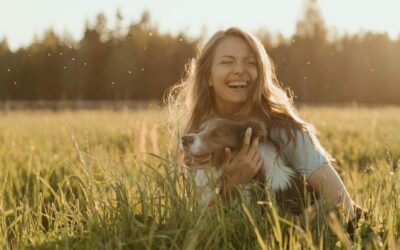Musings, tips, reviews
Blog
Prevent Boredom, Reduce Problems: Toy Rotation for Dogs Made Easy
Have you ever had a friend whose house seems to change a little every time you visit? They rearrange the furniture, or there’s new art on the walls, or even the towels change colour in the bathroom? It often gives the place a new feel. You suddenly notice how large...
9 Bucket List Activities To Do With Your Aging Dog
It can be hard to admit your dog is getting on in years. You might not realise it at first, but one day you'll suddenly notice that things have changed and you're living with an older dog, without knowing exactly when it happened. You may have stopped doing what you...
How a Daily Reflection Practise Helps With Reactivity
Living with a reactive dog can be a challenging, overwhelming, exhausting experience. As someone living with a reactive dog you may find yourself constantly on edge and anxious, never knowing when your dog will react to a trigger. You may feel frustrated, ashamed or...
7 Eco-Friendly Dog Enrichment Ideas
While the adage is that a tired dog is a well-behaved dog, really it’s about contentment and having needs met. Dogs who haven’t had their needs met will try to find their own outlets, often in ways their humans don’t like. Chewing up inappropriate things, restlessness...
5 Fun Spring Activities to Share with Your Dog
April 9 is Easter this year. Soon we’ll see the Sloe trees start to blossom and bluebells carpet the woods. Spring will really be here and it’ll be time for Easter festivities. Most of the Spring activities in the UK come from the Pagan traditions celebrating the...
Why I Don’t Need to See the Problem Behaviour
One of the things I get asked a lot is “do you want to see what happens when….”. It seems that many clients are desperate for me to see the problem behaviour in action. There is a belief that I need to see it to be able to help, or that maybe I won’t believe how bad...
Is Online Dog Training as Effective as In-Person?
Remote online dog training existed before the world ended in 2020, but you’d be forgiven for thinking it didn’t. Most of the online offerings were for the dog training geeks (like me), but there were some targeted at pet parents. But the world changed, and we were all...
Why obedience training will not fix your dog’s behaviour problem
It feels like it should be a simple thing, doesn’t it? To fix your dog's behaviour problem, they “just” need to learn to come back when you call. Or they “just” need to learn they can’t bark and lunge at people you see on a walk. I get twitchy when I hear the word...
Holiday Season Preparation for Your Dog
The holiday season at the end of the year brings a whole bunch of festivities and celebrations that it gets busy fast. All the additional activity and excitement can be a lot to handle. For you and your dog. Then there's the extra guests and visitors, numerous...
Why Residential Training Might Not Work For You
I’m often asked if I will take dogs in and do the training for you. Residential training is not something I offer. There are lots of personal reasons for why I don’t. I believe if I was to offer this the dog would need to live with us at home. That means my dogs would...














